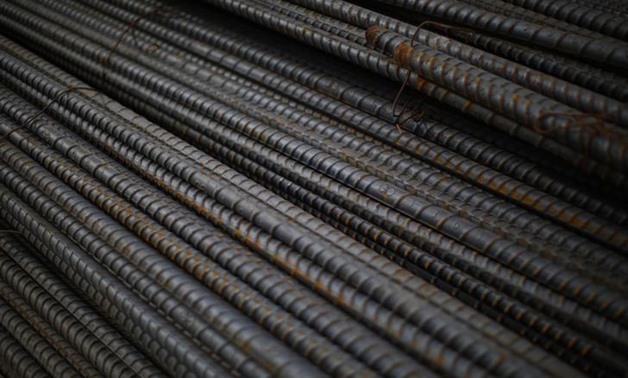
Rebar is seen in New York May 6, 2013 - REUTERS/Eric Thayer/File photo
CAIRO - 19 January 2018: Ministry of Trade and Industry decided early December to maintain tariffs on steel rebar from China, Turkey and Ukraine for five years,
extending a temporary tariff imposed in June 2017.
Although commended by the Industries Federation and welcomed by steel companies as a way to support the local industry, the decision is still raising concerns over
possible price increases.
The decision aims to protect local manufacturing from harmful practices by imported alternatives, Minister of Trade Tarek Kabil said in a statement. He explained that the decision followed an investigation by the ministry into complaints raised by local manufacturers that they were harmed by the imports being sold beyond their normal
value.
The tariff will be set at 17% for Chinese steel, 10 to 19% for Turkish steel, and 15 to 27% for Ukrainian steel. The decision has been welcomed by the Metallurgical
Industries Chamber (MIC) of the Federation of Egyptian Industries. Chamber member Tarek el-Geyoushi says that imposing the tariffs aims at supporting local industry and
does not mean barring imports from all countries.
The decision is “fair” in light of dumping practices [the export by a country or company of a product at a price that is lower in the foreign market than the price charged
in the domestic market], Geyoushi says. He adds that it will not lead to price increases or decreases in the local market because prices in local factories are tied to production
inputs.
Chamber member Rafik el-Daw had also said in previous statements that imposing anti-dumping duty would have a positive impact on the local industry, adding that
steel was imported in large quantities despite an excess in local production that amounts to 4 million tons. Daw added that there was no need to import steel, especially
that the quality of the local product is high.
He said that Egyptian producers were able to export their produce. Another member of the chamber, Hassan el-Marakby, says that the investigations conducted by the Ministry of Trade and Industry have confirmed dumping practices.
He adds that the decision proves that the government is determined to protect the local industry. After imposing the tariffs in June 2017, Egypt’s imports from steel dropped 74% in the first half of the year to approximately 264,000 tons, compared to 1.25 million tons in the same period of 2016, according to figures from the General Organization For Export and Import Control.
Steel companies have reacted positively to the news. On December 6, when the ministry announced the decision, the shares of stock market-listed iron and steel companies recorded hikes. Shares of the Egyptian Iron and Steel Company increased by 0.73% to close at LE 9.6, with a total value of LE 70.4 million traded.
Misr National Steel’s (Ataqa) shares also closed at a 2.42% hike, with the value of each stake standing at LE 18.18. Ezz Steel went up 1.11% as well, to close at
LE 20.02 per share and a total value of LE 63.1 million
traded.
Concerns over a price hike
Though the decision to extend the tariff was lauded by local steel companies, it has still raised concerns over its impact on the prices of steel in the local market. Ahmed
El-Zeiny, head of the building materials division at the Cairo Chamber of Commerce, tells Business Today Egypt that extending the tariffs has confused the market, resulting
so far in a 1% increase in the prices of steel in the local market.
Steel prices have already been climbing since the Ministry of Trade and Industry imposed anti-dumping duties on imported steel in June. Prices jumped from LE 9,000 per ton of rebar steel in May to currently reach LE 12,500, Zeiny says.
He adds that the impact could be limited if more foreign steel companies register with the General Organization for Export and Import Control (GOEIC), in order to be allowed to export steel to Egypt.
“This could make a balance in the market,” Zeiny says. If this does not happen, steel prices will be prone to more increases, he adds. Zeiny further says that the government should not only protect producers but also consumers, who would be harmed should prices of steel increase.
An increase in steel prices would mean an increase in the prices of real estate, he explains, adding that a decision like this should be accompanied by monitoring the domestic market to ensure producers do not gouge prices and do not reduce
their production.
Daker Abdellah, member of the board of directors of the Egyptian Federation for Construction and Building Contractors, also voices concerns about some local factories
increasing prices in the absence of competition with imports.
Abdellah stresses the importance of the state monitoring the market to ensure that there will be no exaggeration in prices and to prevent monopolistic practices in light of a growing demand on steel.
He also says that it is important to establish a state-owned steel factory to provide a high-quality product at affordable prices to cover the needs of citizens, who would be largely affected by any price increase in production inputs that directly impacts the prices of housing units.
Zeiny is not in favor of the decision, saying that the complaint presented was about an incident that happened in 2014. “It’s not logical to issue a decision based on a case that happened three years ago, especially at a time when there are many construction projects underway,” he says.

Comments
Leave a Comment